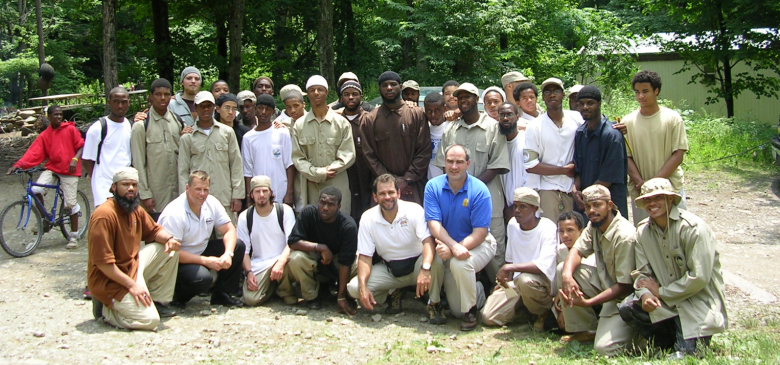Ali Abdelaziz was an informant for the NYPD and FBI for seven years, from 2003 to 2010. Two of those years were spent living at MOA’s “Islamberg” headquarters in Hancock, New York. The NYPD codenamed him “Dolphin,” inspired by the sound of his voice, and the FBI codenamed him “Tap Out,” referring to his submission losses when he competed.
Abdelaziz described to Mawyer how the authorities approached him in jail. Per his account, someone from Washington D.C. came to see him and required him to take a polygraph to become an informant. He was asked about his activities, his intentions and his patriotism. He claims he “passed it, no problem.”
He says he then pled guilty to the misuse of a subpoena as part of his plea deal in order to become a spy.
To better establish his cover, he would be deported as would normally be required once his status as an illegal immigrant was discovered by authorities. The FBI would give him a special green card that would allow him to re-enter the country.
The book, Enemies Within by Matt Apuzzo and Adam Goldman, substantiates this part of his story. One former MOA member confirmed that members believed Abdelaziz was an illegal immigrant, and he was most commonly referred to as “Aladdin.”
Abdelaziz told Mawyer he was paid almost $250,000 per year for his work as a confidential informant. To facilitate the payments, the NYPD set up a front company. He showed Mawyer that he still had at least five boxes of documents, including ones labeled “STK Enterprises.” Pictures of him meeting with MOA leaders and inside MOA members’ homes proved to Mawyer that he was deeply involved in the cult.
He explained that he used the NYPD’s funding to set up his company, Dominance MMA Management. MOA would believe that his income came from managing fighters and from a used car business he owned.
Abdelaziz and his cousin quickly became respected within MOA ranks, in large part due to the wealth they provided. Eyewitnesses described how Abdelaziz often showed off by donating large amounts of money to the organization in front of others, eager to out-do anyone else. This largesse accelerated his access to the group’s leaders.
His proclamations of being an Olympic athlete earned him the admiration of others. He taught members how to read the Koran in Arabic and practiced martial arts with them, skills that MOA greatly valued. One said he “taught all kinds of things” to members, specifically recalling him coaching members in kabbudi, a form of martial arts that is popular in Pakistan.
Public records first show Ali Abdelaziz registered to an address in Islamberg in August 2005.
He became particularly close with Chief Executive Hussein Adams, nicknamed “K2.” He is the son of convicted MOA terrorist Barry Adams, who spearheaded a 1991 plot to bomb Toronto during a Hindu festival.
The elder Adams remains a prominent, but highly secretive, leader within MOA. Several sources say that Gilani honored Barry Adams with the title of “khalifah” for going to prison for his involvement in dangerous “missions” like the 1991 plot and not turning against the organization. Some say he is the most influential MOA leader besides Gilani and his sons.
He continued to lead the organization from a Canadian prison cell. Abdelaziz said MOA officials would visit the prison to meet with him, sometimes for several days in a row. Other sources confirm this.
Abdelaziz said he traveled with Hussein Adams to other camps, such as those in Virginia and South Carolina, when internal disputes had to be settled. Hussein Adams was “untouchable” and “very smart,” Ali said. He was seen as somewhat of a “bodyguard” and right-hand man for Adams.
Barry Adams’ influence grew after he was released from prison and deported back to Trinidad in 2006. Abdelaziz went to Trinidad to prepare for his arrival. MOA sources and Caribbean-based intelligence sources confirm that he has traveled back and forth between Trinidad and a remote area of Venezuela.
Abdelaziz said that Barry Adams nicknamed him “The Jackal,” in honor of the Venezuelan terrorist known as “Carlos the Jackal” who belonged to the Popular Front for the Liberation of Palestine.
However, a former MOA member says that Hussein Adams had another nickname for Abdelaziz: “The Post Man.” The source was uncertain of the reasoning, but it might be a reference to his drug trafficking with Tabari Zahir using UPS.
Abdelaziz also had an inside view of MOA’s efforts to present a softer image to the public and law enforcement.
He is seen below with Hussein Adams, other MOA members and members of the FBI during an outreach event:
Above: A picture from a MOA event (held under the name of the Muslim Scouts of America) in Binghamton, NY in 2005, which included a presentation by FBI personnel. Ali Abdelaziz is at the bottom-right. Hussein Adams is at the bottom-left. Ali told Mawyer that MOA “bullshits” law enforcement at such events.
One former MOA member remembers being castigated by several others in the organization when she expressed her suspicions of Abdelaziz, going so far as to say he “might not be a real Muslim.”
He complained about the poor living conditions at Islamberg and sometimes refused to stay there. Such behavior was at odds with MOA’s focus on poverty as a virtue that would bring followers closer to God.
She said that he even expressed disagreement with Sheikh Gilani’s teachings when he was talking to the members who were closest to him. That was the only time she ever saw that happen without the member getting punished in some way. She concluded that the MOA leaders did not want to risk losing his money and skills by alienating him.
Though he was embraced by Hussein Adams and his inner circle and was respected within the group, some MOA members were put-off by his attitude.
Multiple sources described him as “very, very arrogant,” “so annoying,” self-absorbed and entitled. Bragging was a part of his typical conversations, often saying he’s “the best” boxer and basketball player.
One former MOA member who saw him when he travelled with Hussein Adams recalls him as nitpicking others, especially women. He would confront females for violating MOA’s dress code by wearing makeup or not fully covering their hair and neck.

